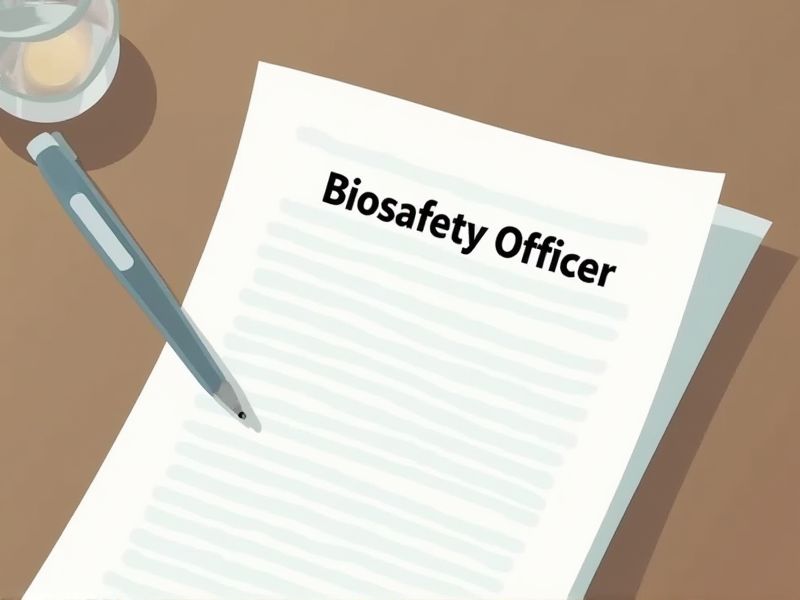
Biosafety Officers play a crucial role in maintaining a safe environment in research facilities and laboratories. Lack of appropriate certifications can lead to overlooked hazards and potential biological risks. Certifications ensure that individuals are proficient in identifying and mitigating biohazard threats. Key certifications often required for a Biosafety Officer include those ensuring competency in risk assessment and safety procedures.
Certified Biosafety Professional (CBSP)
Certified Biosafety Professionals (CBSP) ensure adherence to biological safety regulations, reducing the risk of accidents in laboratories. This certification verifies a professional's in-depth understanding of biosafety principles and procedures, enhancing compliance with international standards. Organizations employing CBSPs can mitigate legal liabilities by demonstrating due diligence in safety management. A CBSP on staff often leads to improved safety culture, fostering an environment that prioritizes the well-being of personnel and the surrounding community.
Registered Biosafety Professional (RBP)
A Registered Biosafety Professional (RBP) provides validated expertise, ensuring baseline competence for a Biosafety Officer. Certification as an RBP elevates trust, facilitating compliance with biosafety regulations and guidelines. Having an RBP designation helps in assessing and mitigating risks associated with biological materials within facilities. The credential assists in maintaining a secure and safe environment by implementing high-standard biosafety practices.
NIH Biosafety Training Certification
NIH Biosafety Training Certification ensures that Biosafety Officers possess the necessary knowledge to safely manage and oversee biological research environments. This certification provides validation that officers are up-to-date with the latest biosafety guidelines and protocols, which reduces the risk of hazardous incidents. Understanding specific NIH standards helps Biosafety Officers implement effective safety measures tailored to their specific institutional needs. Possessing this certification fosters a culture of safety and compliance, critical for maintaining the integrity of research activities.
Biosafety Level 3/4 Certification Course
Biosafety Level 3/4 Certification Course equips Biosafety Officers with critical skills to handle high-risk pathogens safely. Without this certification, the officers would lack the necessary expertise to implement safety protocols effectively. The course ensures compliance with regulatory standards, reducing legal risks to institutions. Trained officers are essential in maintaining laboratory safety and preventing potential outbreaks.
Certified Safety Professional (CSP)
A Certified Safety Professional (CSP) credential enhances a Biosafety Officer's credibility and demonstrates a high level of expertise in safety management principles. Employers rely on the CSP certification as a benchmark for hiring decisions, ensuring the officer is equipped to handle complex safety issues in biological environments. The CSP designation signifies advanced knowledge in risk assessment, critical for managing hazardous biological agents effectively. This certification also helps in compliance with regulatory standards, reducing the risk of legal penalties for the organization.
Certified Industrial Hygienist (CIH)
A Certified Industrial Hygienist (CIH) is needed for a Biosafety Officer role because the CIH provides expertise in identifying and mitigating workplace hazards. This expertise is crucial for ensuring effective biosafety protocols and preventing contamination or exposure to harmful substances. The CIH's understanding of industrial hygiene principles supports compliance with health and safety regulations in biohazard environments. Their knowledge of risk assessment enhances the implementation of safety measures in laboratory and industrial settings.
OSHA 30-Hour General Industry Certification
The OSHA 30-Hour General Industry Certification equips a Biosafety Officer with a comprehensive understanding of workplace safety standards and regulations. This certification is crucial for identifying and mitigating potential hazards within a laboratory or industrial setting, which is essential for maintaining a safe environment. Through this training, a Biosafety Officer can effectively implement safety protocols that comply with federal regulations, reducing the risk of accidents and injuries. Employers value this certification as it demonstrates a commitment to safety and ensures the officer is well-prepared to handle emergencies and ensure compliance.
Certified Hazardous Materials Manager (CHMM)
A Biosafety Officer must manage and mitigate the risks associated with hazardous materials in a laboratory setting, making the knowledge from a Certified Hazardous Materials Manager (CHMM) credential essential. The CHMM training provides expertise in regulatory compliance and safety protocols, ensuring a safer work environment. Understanding chemical properties and emergency response strategies is crucial for addressing incidents swiftly and effectively. The credential enhances skills in waste management and hazard communication, crucial for maintaining biosafety standards.
Emergency Management Certification (CEM)
Emergency Management Certification (CEM) equips a Biosafety Officer with critical skills to effectively plan and respond to biological emergencies, reducing potential risks in laboratory environments. Possessing this certification ensures they are well-versed in the latest standards and strategies, which enhances their ability to manage unexpected biosafety incidents. This specialized knowledge fosters a robust safety culture within the organization by driving compliance with international biosafety protocols. A Biosafety Officer with a CEM designation is more likely to gain the trust of colleagues and stakeholders, which can improve safety communication and cooperation across departments.
Laboratory Biosafety Certification
Laboratory Biosafety Certification is needed for a Biosafety Officer to ensure they have the knowledge and skills to handle hazardous biological materials safely. Certification establishes a standardized understanding of biosafety principles, reducing the risk of accidental exposure or contamination. Trained Biosafety Officers can effectively implement and maintain safety protocols, ensuring compliance with regulations. Certified officers play a crucial role in fostering a safe working environment, protecting both laboratory personnel and the surrounding community.
Summary
You can anticipate enhanced credibility when a Biosafety Officer obtains certifications, as professional credentials validate their expertise. Certifications increase their knowledge, potentially leading to more effective implementation of safety protocols. This development often results in a safer laboratory environment, reducing the likelihood of accidents. Certified officers may also have increased career opportunities, contributing to professional growth.
